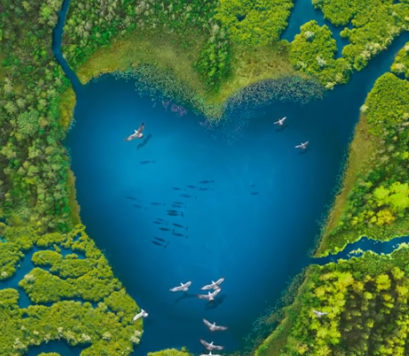NCDEQ SEEKS COMMENTS FOR TEMPORARY WETLANDS RULES
North Carolina needs a state wetlands permitting program
The NC Environmental Management Commission (EMC) has proposed a temporary rule to establish a state permitting program to manage impacts to over a million acres of wetlands in North Carolina. Wetlands and small streams play a critical role in filtering harmful pollution, protecting drinking water, sustaining our wildlife, and reducing flooding downstream. The proposal by the EMC fills a critical permitting gap created by the rollbacks of federal wetland protections. Environmental advocates are generally supporting the proposal, with a few modifications.
Take Action by April 12th
Help us show the EMC that North Carolinians support protecting our wetlands by sending an email today!
Public comments on the proposed temporary rule can be submitted to PublicComments@ncdenr.gov, with ‘Wetlands Rules’ in the subject line, by 5 pm on Friday, April 12.
Here are our key talking points:
● Wetlands and small streams reduce flooding downstream. In a time when storms are getting more intense and flooding more frequent, losses in the landscape’s natural flood storage capacity translate directly to loss of homes and businesses in the watershed.
● Wetlands and small streams also clean our drinking water, recharge groundwater, and sustain fisheries and wildlife.
● The proposed temporary rule will establish a permitting program to ensure that impacts to wetlands and small streams are better managed to protect neighbors and the public.
● Because the loss of wetlands and streams happens mostly through the proverbial ‘death by a thousand cuts’ – hundreds of small projects rather than just a few large ones – it’s important that the threshold below which projects can proceed with no review be as low as possible.
Although advocates want the EMC to adopt the temporary rule, we are concerned about one aspect of the proposal: it allows projects with up to ½ acre of impacts (1/3 acre in the mountains) to proceed with no review and no mitigation to offset impacts. Since most ongoing loss of wetlands and streams happens from hundreds of small projects rather than a few big projects, the cumulative losses under the ½ acre threshold will be significant. If this is not fixed in the temporary rule, it should be addressed in the permanent rule to follow this Fall.
Some Background
In April 2020, the Environmental Protection Agency and the U.S. Army Corps of Engineers issued a new rule eliminating federal oversight for millions of acres of wetlands and small streams. The Southern Environmental Law Center has estimated the rule resulted in a loss of federal protections for roughly 900,000 acres in the Cape Fear and Neuse river basins alone — much larger across the Coastal Plain as a whole, or statewide.
North Carolina has already lost more than 50% of our wetlands and those that remain are vital for absorbing stormwater and preventing flooding downstream, among the many other benefits they provide. READ MORE ABOUT THE IMPORTANCE OF WETLANDS HERE!
The NC Environmental Management Commission (EMC) has proposed a new rule that would establish a state permitting program to protect our wetlands and manage flooding in our communities.
NC Department of Environmental Quality staff and the EMC have announced they will also shortly begin work on a permanent rule that will eventually replace the temporary rule, with more opportunities for public input on that later this year.

Wetlands and small streams are incredibly valuable!
Wetlands – undeveloped areas where water makes the soil soggy, seasonally or year-round – are essential for flood control. One acre of floodplain wetland can store upwards of 1 million gallons of water, protecting downstream communities. Beyond flood control, wetlands also recharge groundwater supplies (important for the millions of North Carolinians who get their water from wells), clean pollutants out of surface waters, and support our fisheries.
Small, headwater streams are often surrounded by wetlands and are similarly important. They help avert flooding, and also play a key role as filters, keeping runoff pollution out of larger rivers and surface drinking water sources downstream. The purpose of wetlands regulation – federal and state – is not to stop all impacts to wetlands, but to ensure that impacts are avoided if possible, and managed where necessary. So, for example, a developer who fills part of a wetland or stream for a project may be required to compensate by restoring or creating a wetland elsewhere in the watershed. Without that, many new projects would indirectly flood downstream neighborhoods and businesses.
In 2020, the US Environmental Protection Agency and the US Army Corps of Engineers finalized a new ‘Waters of the United States’ (WOTUS) rule interpreting federal jurisdiction very narrowly, eliminating federal oversight for millions of acres of wetlands and small streams. The Southern Environmental Law Center has estimated the ‘coverage gap’ created by the 2020 federal rule is roughly 900,000 acres in the Cape Fear and Neuse basins alone – much larger statewide.
Wetland types that have lost significant federal coverage under the 2020 federal rule include headwater forests, some bottomland hardwoods, floodplain pools, pine flats, pine savannahs, hardwoods flats, and non-riverine swamp forests.
On both a local and a watershed level, these wetlands and streams are vital for flood control, water quality, groundwater recharge, and fisheries.
Fortunately, North Carolina’s state law still requires a permit before a project can fill or destroy these waters. North Carolina state rules currently offer a permitting process only for isolated bogs and basin wetlands, which have been excluded from federal jurisdiction for years. Otherwise, the state has relied on the federal program, without a free-standing state permit process for other wetlands.
This means, in the wake of the new federal rule, that a large acreage of wetlands and streams cannot be touched under state law, even when an applicant has already done their best to minimize impacts. The proposed temporary rule will allow these projects to proceed. It does not assert state oversight over wetlands that haven’t already been regulated by the state for years – it just gives developers a way to legally impact wetlands and streams, so their projects can move forward.

